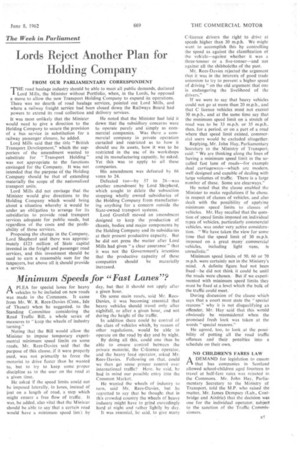Minimum Speeds for "Fast Lanes"?
Page 31

If you've noticed an error in this article please click here to report it so we can fix it.
A PLEA for special lanes for heavy
vehicles to he included on new roads was made in the Commons. It came from Mr. W. R. Rees-Davies (Cons., Isle of Thanet) when he suggested, to the Standing Committee considering the Road Traffic Bill, a whole series of measures to "keep the wheels of industry turning."
Noting that the Bill would allow the Minister to impose temporary experimental minimum speed limits on some roads, Mr. Rees-Davies said that the purpose of this clause, if it were properly used, was not primarily to force the motorist to drive faster than he wanted to, but to try to keep some proper discipline as to the user on the road at a given time.
He asked if the speed limits could not be imposed laterally, in lanes, instead of just on a length of road, a step which might ensure a free flow of traffic. It was, he added, also vital that the Minister should be able to say that a certain road would have a minimum speed linf t by day, but that it should not apply after a given hour.
On some .main roads, said Mr. ReesDavies, it was becomingessential that heavy vehicles should travel only after nightfall, or after a given hour, and not during the height of the traffic.
In addition there could be control of the class of vehicles which, by reason of other. regulations, would be able to operate on the road by day and by night.
By doing all this, could one thus he able to ensure control between the private motorist, the C-licence operator, and the heavy load operator, asked Mr. Rees-Davies. Following on that, could we then get sonic proper control over international traffic? Here, he said, he had in mind our possible entry into the Common Market, He wanted the wheels of industry to turn, said Mr. Rees-Davies, hut he regretted to say that he thought that in th:s crowded country the wheels of heavy industry might have to grind exceedingly hard at night and rather lightly by day.
It was essential, he said, to give many C-licence drivers the right to drive at speeds higher than 30 m.p.h. We might want to accomplish this by controlling the speed as against the classification of the veh:cle—against whether it was a three-tonner or a five-tonner--and not against all the shibboleths of the past.
Mr. Rees-Davies rejected the argument that it was in the interests of good trade unionism to try to prevent a higher speed of driving " on the old argument that one is endangering the livelihood of the drivers."
If we were to say that heavy vehicles could not go at more than 20 m.p.h., and that C licence vehicles must not exceed 30 mph., and at the same time say that the minimum speed limit on a stretch of road was to be 33 m.p.h. or 35 m.p.h., then, for a period, or on a part of a road where that speed limit existed, commercial users would be excluded altogether.
Replying, Mr. John Hay, Parliamentary Secretary to the Ministry of Transport, said: "We are thinking along the lines of having a minimum speed limit in the socalled fast lane of roads—for example dual carriageways—which are modern, well designed and capable of dealing with large volumes of traffic. There is a large number of these. Some are clearways."
He noted that the clause enabled the Minister to make regulations if he chose. in respect of classes of vehicles, and also dealt with the possibility of applying minimum speed limits to classes of vehicles. Mr. Hay recalled that the question of speed limits imposed on individual types of vehicles, particularly commercial vehicles, was under very active consideration. " We have taken the view for some time that the speed limit of 30 m.p.h. imposed on a great many commercial vehicles, including light vans, is unrealistic."
Minimum speed limits of 50.60 or 70 m.p.h. were certainly not in the Ministry's mind. A definite figure had not been fixed—he did not think it could be until the roads were chosen. Rut if we experimented with minimum speed limits they must be fixed at a level which the bulk of
the traffie could meet.
During discussion of the clause which says that a court most state the "special reasons" why it is not disqualifying an offender. Mr. Hay said that this would obviously be reconsidered when the promised fresh look was taken at the words "special reasons."
He agreed, too, to look at the possibility of putting all the road traffic offences and their penalties into a schedule on their own.




































































































